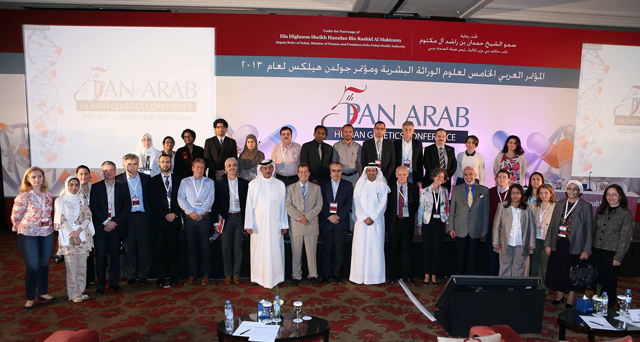5th Pan Arab Human Genetics Conference concludes its activities in Dubai
19 November 2013
The recommendations issued by the 5th Pan Arab Human Genetics Conference included the importance of enhancing mutual cooperation among Arab geneticists to implement a joint Arab scientific project under the umbrella of the Centre for Arab Genomic Studies (CAGS).
The participants agreed on the importance of promoting human genetics research in the Arab countries, particularly in Sudan, Morocco, Algeria and Jordan. They recommended prioritizing the funding of young researchers, whether to complete their academic studies or for their research. They also stressed on the importance of finding practical solutions to overcome the regulatory and administrative obstacles to forming common research groups.
These recommendations came within the context of the closing activities of the 5th Pan Arab Human Genetics Conference and Golden Helix Symposium 2013 with the participation of over 900 doctors, medical students and geneticists from more than 15 Arab and foreign countries. The conference was organized by the Centre for Arab Genomic Studies, a center of the Sheikh Hamdan Bin Rashid Al Maktoum Award for Medical Science, and the Golden Helix Foundation.
Prof. Najib Al Khaja, Secretary General of HMA and President of the Centre for Arab Genomic Studies and the conference, expressed his pleasure at hosting such a successful conference which has witnessed a great deal of interaction from the Arab geneticists and doctors. He also praised the significant initiatives received by CAGS from many global associations during the conference.
“On the sidelines of the conference, I attended a meeting with 17 members of CAGS’ Arab Council and Executive Board from the United Arab Emirates, Qatar, Bahrain, Saudi Arabia, Oman, Egypt, Sudan, Lebanon, Tunisia and Palestine”, Al Khaja said.
“The meeting discussed the achievements of CAGS during the last ten years, since its establishment in 2003 until now, and its future strategy to cope with the challenges facing the Arab countries in that field in the light of the available human and financial resources”, Al Khaja added.
“The future work in CAGS will focus on the scientific research through collaboration with research and academic bodies in the field of human geentics, particularly personalized medicine, as well as training the specialists working in the healthcare sectors in the Arab countries”, he added.
“During the meeting, the members stressed on the importance of briefing officials in the health sectors in the GCC countries on the data included in the CTGA to guide them while putting the future plans”, he said.
The sessions of the 3rd day of the Pan Arab conference were very interesting. In a session entitled Clinical Genomics, some of the recent advances in the field of genomics in reference to the treatment and management of genetic diseases were highlighted. Prof. Aid Al Aqeel talked about the challenges as well as the progress and recent advances in the implementation of personalized transitional genomics in the clinical setting.
Prof. Achilleas Gravanis talked about his work in deploying microneurotrophins in the treatment of neurodegenerative diseases. In the same vein, Dr. Vasilis Vasiliou lectured on the possibility of using the Aldehyde Dehydrogenase protein in the treatment of a range of metabolic diseases. He also touched upon the use of this protein as a marker of cancer stem cells.
A session entitled “Clinical Applications and Pharmacogenomics” dealt with the Pharmacogenomics analyses and how an individual’s genetic makeup influences his/her response to drugs. Dr. George Patrinos proposed a multi-step approach for the implementation of pharmacogenomics in developing countries, focusing on emerging countries.
Dr. Ron van Schaik delivered a talk on the uptake of pharmacogenetics in the clinical setting. Dr. Hayat Aljaibeji presented the results of her study to determine the frequency of the alleles and genotypes of VKORC1 gene in the Emirati population. This knowledge is expected to enable physicians to decide on the initial dose of the anticoagulant, Warfarin.
Dr. Reham Milhem and her colleagues have identified mutations in two separate genes resulting in two different genetic disorders, CMS and FEVR. Both the defective proteins were found to be retained in the Endoplasmic Reticulum. Dr. Milhem talked about her results in her talk.
And finally, the last session in the conference dealt with the role played by the science of genomics in public health. In a way this session summed up the impact of recent advances in molecular biology and genetics on public health. Prof. Angela Brand from the Maastricht University summarized her vision about the management and integration of rapid scientific advances in public health to achieve optimum results in healthcare and personalized medicine.

